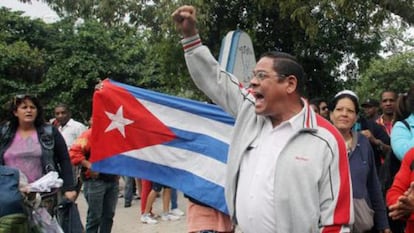Almost 100 activists arrested marking Human Rights Day in Cuba
Police detain dissidents holding demonstrations around the country

Just as they do every December 10, Cuban police on Wednesday arrested nearly 100 dissidents who were holding demonstrations in seven provinces to mark International Human Rights Day.
At least 32 people were detained in Havana as they tried to join a march led by the Ladies in White and the Movimiento Nueva República near the popular Coppelia ice cream parlor.
According to reports from Unión Patriótica de Cuba (Unpacu), 27 more were detained in Holguín. And at least a further 20 were arrested in Isla de Juventud, together with 12 in Las Tunas, three in Guantánamo, one in Manzanillo and another in Bayamo.
We have had arrests in almost all provinces” Unpacu general coordinator José Daniel Ferrer
“Several activists have been released,” Unpacu general coordinator José Daniel Ferrer told EL PAÍS from Santiago de Cuba. “In Havana, several individuals have been freed and now they are at home. They usually release them a few at a time throughout the night. They never release them all at once for fear they might create another protest.”
“Our reports are incomplete; they depend on whatever dispatches our people are able get to us before or after the arrest,” Ferrer explains. “But we have had arrests in almost all provinces,” he adds.
The police operation in the area around Coppelia and the Yara movie theater, which hosts the Havana Film Festival, led to two dozen arrests in front of the eyes of a group of accredited foreign correspondents.
Reuters journalist Daniel Trotta reported: “Police officers dressed in plain clothes dispersed the demonstrators who were chanting ‘Long live human rights’ while holding up their index fingers and thumbs in an ‘L’ shape as a symbol for liberty and freedom. The police put the detainees in several cars.”
Several have been freed, but they never release them all at once for fear they might create another protest” Unpacu general coordinator José Daniel Ferrer
Two reporters from 14 y Medio, which is edited by dissident journalist Yoani Sánchez, were arrested while covering the story. They were freed three hours later.
According to Efe news agency, Ladies in White leader Berta Soler and her husband, Ángel Moya – an activist who was imprisoned for treason in 2003 – could not even get to the march. They were arrested a few feet from their home, the agency reported.
Meanwhile, the police searched for two women from Unión Patriótica de Cuba at their homes in downtown Havana. The two activists were suspected of placing stickers promoting human rights on walls and posts throughout the city. In the interior, most dissidents were arrested on their way to marches or while handing out copies of the Universal Declaration of Human Rights.
Between Tuesday and Wednesday, Cuban officials freed four dissidents who had spent at least two years behind bars. Lady in White Sonia Garro, her husband Ramón Alejandro Muñoz and the activist Eugenio Hernández were released on Tuesday afternoon. The trio had been taken into custody in 2012 and will have to stand trial on charges of public disorder and attempted homicide. On Wednesday, authorities freed Juan Carloz Vásquez, Unpacu coordinator in Moa (Holguín province) after completing his two-year prison sentence for planning an attack.
According to the Commission for Human Rights and National Reconciliation (CCDHRN), an organization based in Havana, there are 110 political prisoners in Cuba. CCDHRN director Elizardo Sánchez says the Cuban government has replaced long prison sentences with short-term detentions and intimidation tactics such as “acts of repudiation” to silence dissident voices. By November 2014, CCDHRN had reported 8,410 short-term detentions, an average of 764 a month.
Translation: Dyane Jean François
Tu suscripción se está usando en otro dispositivo
¿Quieres añadir otro usuario a tu suscripción?
Si continúas leyendo en este dispositivo, no se podrá leer en el otro.
FlechaTu suscripción se está usando en otro dispositivo y solo puedes acceder a EL PAÍS desde un dispositivo a la vez.
Si quieres compartir tu cuenta, cambia tu suscripción a la modalidad Premium, así podrás añadir otro usuario. Cada uno accederá con su propia cuenta de email, lo que os permitirá personalizar vuestra experiencia en EL PAÍS.
¿Tienes una suscripción de empresa? Accede aquí para contratar más cuentas.
En el caso de no saber quién está usando tu cuenta, te recomendamos cambiar tu contraseña aquí.
Si decides continuar compartiendo tu cuenta, este mensaje se mostrará en tu dispositivo y en el de la otra persona que está usando tu cuenta de forma indefinida, afectando a tu experiencia de lectura. Puedes consultar aquí los términos y condiciones de la suscripción digital.









































